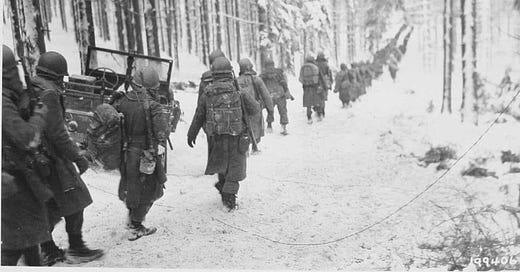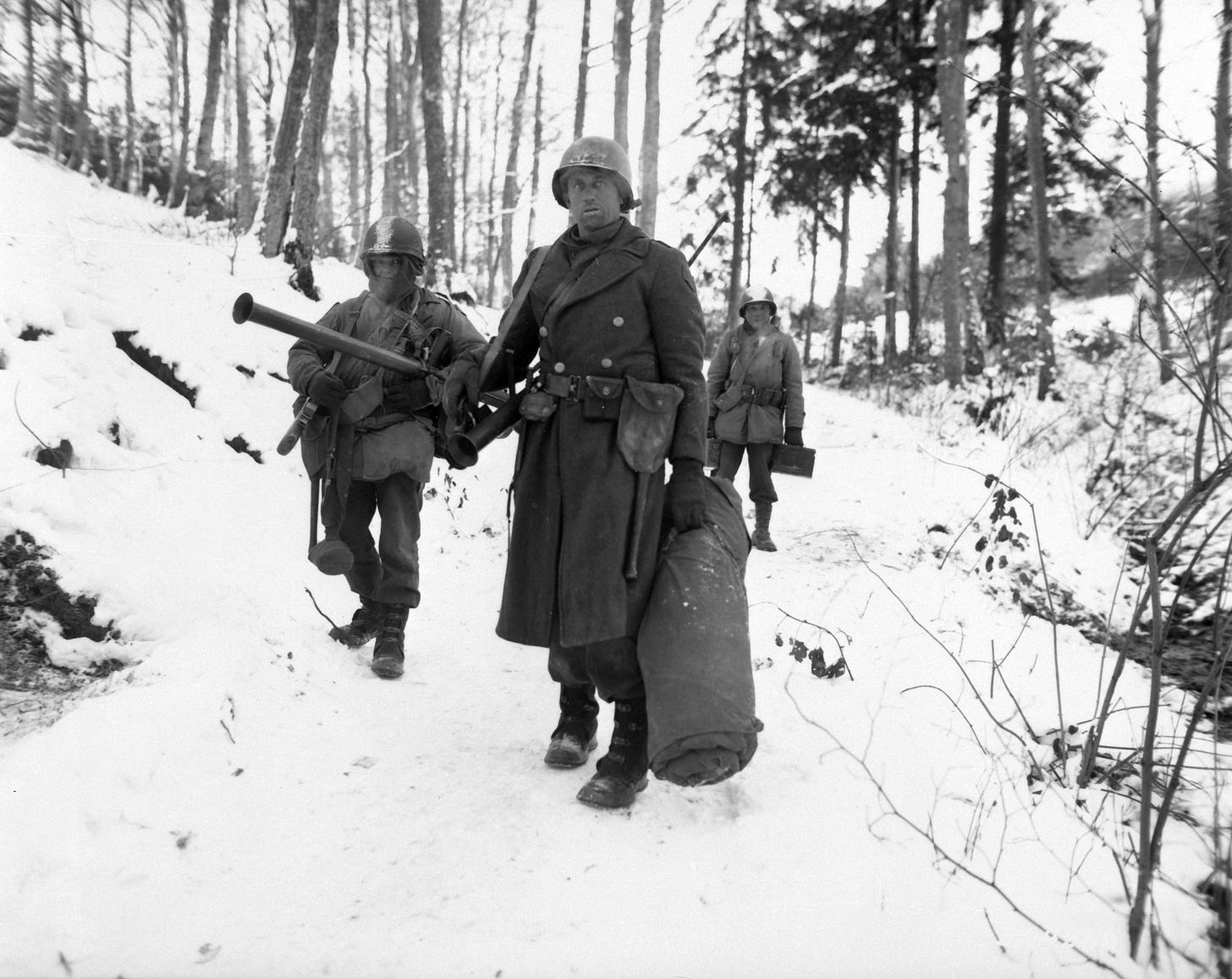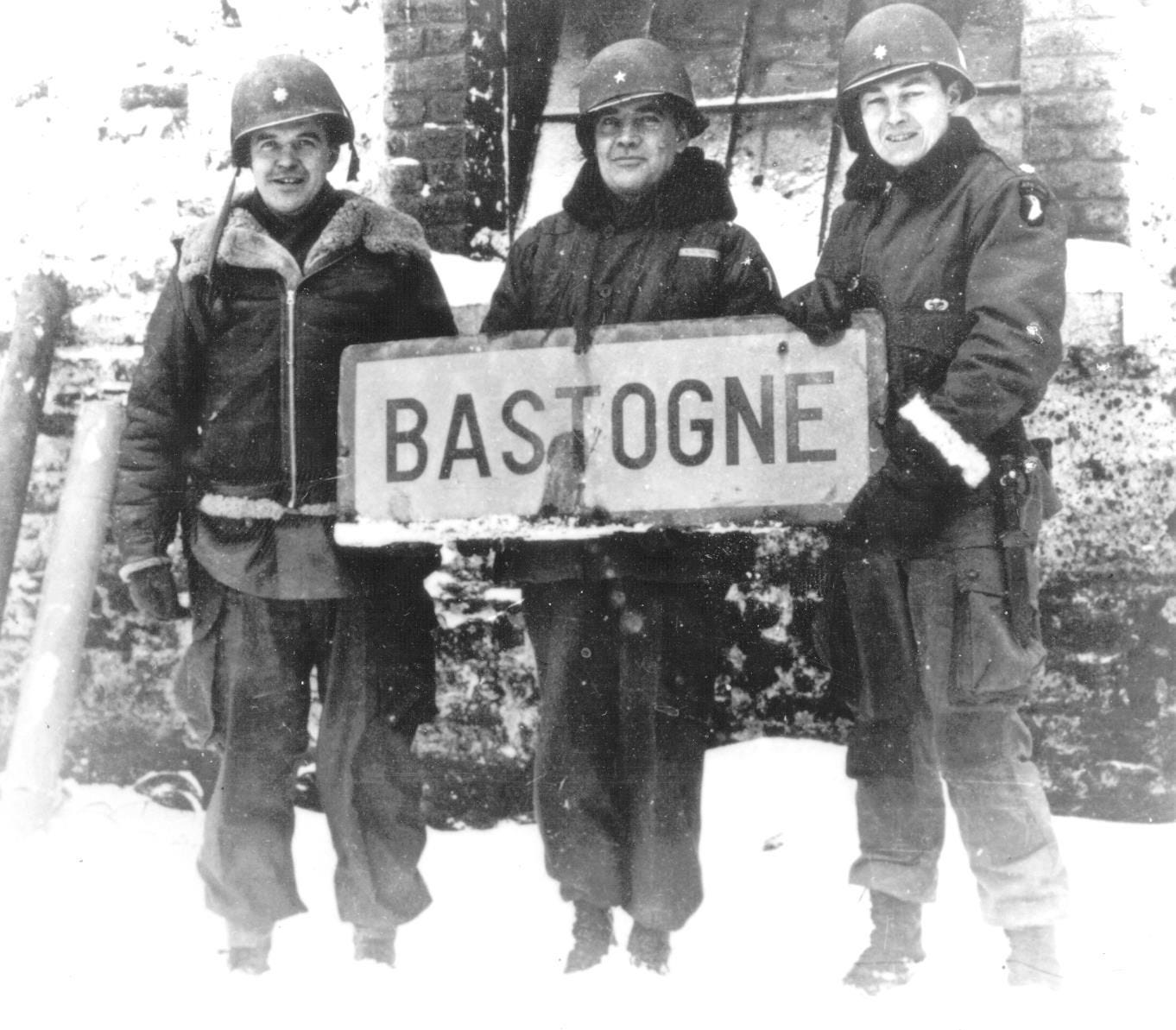Glory, Glory What a Hell of a Way To Die
Punctuating the fog-enshrouded dawn of the sixteenth of December, 1944, a force of 200,000 German troops, accompanied by a formidable assembly of nearly one thousand tanks, set forth upon Hitler's final venture to reverse the dwindling tide of his fortunes.
With aspirations to cleave through to the English Channel's coast and rend asunder the Allied legions in a manner reminiscent of prior successes, the German forces unleashed their might along a 75-mile front marked by dense timberlands and sparse roadways.
It was here that tired Allied soldiers had sought respite and refinement. But it was not to be.
And so it came to pass in the depths of winter's embrace, through the frosted whisper of snow-clad trees, that there marched a column of brave souls, their shadows long and spirits resolute.
These were the valiant men who trudged through the frigid clutch of the Ardennes, hearts ablaze amid a bitter tempest, in what history would record as the Battle of the Bulge.
The call to duty fell upon them as a furious avalanche, sudden and unswervable. The time to equip, organize, or protect themselves against the conditions was the first casualty of a battle as ruthless in its urgency as its scorching of Earth, flesh, and metal.
With neither hesitation nor futile bargaining against the immutable force of the bloody prospect upon them, they marched.
And upon this glacial canvas they advanced. Pursuing neither glory nor liberty, but in defense of one another, and so seized with the highest devotion.
With each labored breath bitterly visible, with each step upon the snow's crunch, they bore more weight than was fair. They took up arms for brothers, and by extension, countrymen.
And those hard-bitten woods, before they filled with smoke and fire and thunder and blood, first filled with song.
"Glory, glory what a hell of a way to die" they chanted, toothy smiles steaming the air. With jolly menace and unbreakable unity, they chuckled at danger.
No cold weather gear. Sparse ammunition. The grim reaper's greedy grip on every cold shoulder.
And still, they sang rather than whimper, taunting peril as they descended into an icy oblivion.
Surrounded, besieged, and outnumbered, they fought amid felled trees and encumbering snowdrifts. No rest, no comfort. No hope. And yet they fought on without it, eventually turning the tide.
And by the twenty-fifth of January, 1945, they had out-witted, out-maneuvered, outlasted, and out-toughed a worthy but weary opponent. The guns fell silent.
Never again would Germany gather the means or will for a major battle. Bested in a feat of arms invited by the folly of their rush into the teeth of the hardest bastards known to history, they would never live down, nor legend forget, the response of the American commander to their demand for a surrender that was never going to happen.
"To the U.S.A. Commander of the encircled town of Bastogne.
The fortune of war is changing. This time the U.S.A. forces in and near Bastogne have been encircled by strong German armored units. More German armored units have crossed the river Ourthe near Ortheuville, have taken Marche and reached St. Hubert by passing through Hompre-Sibret-Tillet. Libramont is in German hands. There is only one possibility to save the encircled U.S.A troops from total annihilation: that is the honorable surrender of the encircled town. In order to think it over a term of two hours will be granted beginning with the presentation of this note. If this proposal should be rejected one German Artillery Corps and six heavy A. A. Battalions are ready to annihilate the U.S.A. troops in and near Bastogne. The order for firing will be given immediately after this two hours' term. All the serious civilian losses caused by this artillery fire would not correspond with the wellknown American humanity.
The German Commander."
To which Brig. Gen. Anthony McAuliffe’s single-word response was instantly delivered.
“To the German Commander:
N U T S !
The American Commander.”
“The moral is to the physical as three is to one,” Napoleon once said. The Battle of the Bulge proves this point. And if D-Day was the end of the beginning, Bastogne proved the beginning of the end.
It was 79 years ago, but those who survived could never forget it. On behalf of those who didn't, nor should we.
Here's to them.
TC is an American veteran and retired U.S. Air Force officer.








